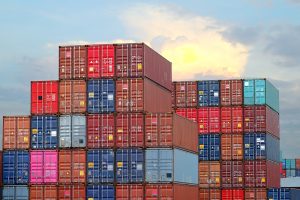 As of midnight on October 1, the International Longshoremen’s Association (ILA) is on strike, as no master contract was reached before October 1, when their six-year-old labor agreement with the U.S. Maritime Alliance (USMX) expired.
As of midnight on October 1, the International Longshoremen’s Association (ILA) is on strike, as no master contract was reached before October 1, when their six-year-old labor agreement with the U.S. Maritime Alliance (USMX) expired.
The USMX, representing ocean carriers and terminal operators, and the ILA dock workers union cannot reach agreement on wages, pensions and health care, together with the controversial issue of automation. Talks broke down in June.
Late last week, the USMX filed an unfair labor practice charge against the ILA with the National Labor Relations Board (NLRB), alleging the ILA is participating in unfair labor practices, thus escalating the tension.
The strike has the potential to disrupt U.S. supply chains and has national security implications. In general terms, paralyze as much as half the nation’s seaborne trade volumes.
Shipping Data
More specifically, nearly 70% of U.S. exports and 56% of containerized U.S. imports come through East Coast and Gulf Coast ports, according to data cited by the National Association of Manufacturers. More specifically:
- More than 68% of all containerized exports and more than 56% of containerized imports flow through East and Gulf Coast ports, representing an average daily trade value of more than $2.1 billion.
- They handle more than 91% of containerized imports and 69% of containerized exports of pharmaceutical products.
- They also process more than 76% of containerized vehicle exports and more than 54% of containerized vehicle imports.
- For aircraft and spacecraft, more than 77% of containerized exports and more than 51% of containerized imports go through these ports.
The ILA strike affects 45,000 dockworkers at 36 container ports from Texas to Maine — including New York/New Jersey, Houston, and Savannah, Georgia. The contract in question covers six of the 10 busiest U.S. ports, which collectively handle more than 13 million containers annually.
Products Affected
Perishable food imports, wine, auto parts and pharmaceuticals from Europe will be affected greatly. Ports on the East and Gulf coasts also handle roughly 75% of the bananas that enter the United States. There is a no strike pledge for U.S. military goods and passenger cruise vessels will not be affected. The ILA has not gone on strike since 1977.
The labor dispute comes at a critical time for retailers and consumers preparing for the holiday season.
Oxford Economics estimated that a strike would cost the US economy $4.5 billion to $7.5 billion a week.
Maersk, the Danish shipping company, has warned that even a one-week shutdown could result in 4–6 weeks of recovery time, with significant backlogs and delays compounding each day.
Analysts at Sea-Intelligence, a Copenhagen-based shipping advisory firm, estimate it could take anywhere from four to six days to clear the backlog from a one-day strike. A two-week strike could mean that ports would not return to normal operations until 2025, Sea-Intelligence said.
West Coast Impact
A prolonged shutdown could affect West Coast ports and eventually leading to capacity and empty container shortages.
Imports to the U.S. West Coast ports have been increasing. Container carriers have been rerouting Halloween costumes and Christmas items in preparation for the labor action. And manufacturers have been purchasing solar panels and other goods targeted for potential tariff increases. This rerouting adds time and costs to businesses and the consumer.
The strike comes at a challenging time for ocean supply chains, which have already faced significant disruptions this year with the drought in the Panama Canal, the Baltimore Bridge collapse, and the Red Sea conflict. There has been talk of West Coast workers being unwilling to unload cargo originally bound for the East Coast and worst case scenario would be if the West Coast dock workers walked out in solidarity.
The Federal Maritime Commission (FMC) has warned carriers and operators against imposing excessive detention and demurrage fees during the strike, to protect shippers from unfair charges such as occurred during the pandemic-related port congestions.
Coalition Request
On September 17, a coalition of 177 trade associations wrote to ask President Joe Biden to intervene, warning of severe economic consequences if a deal isn’t reached. The letter stated, “A strike at this point in time would have a devastating impact on the economy, especially as inflation is on the downward trend.”
The administration faces pressure to intervene but has expressed reluctance to invoke the Taft-Hartley Act by imposing an 80-day cooling-off period. On Sunday, September 29, President Joe Biden said he did not intend to intervene to prevent a walkout. “It’s collective bargaining. I don’t believe in Taft-Hartley,” he told reporters.
The Biden administration did step in to help the International Longshore and Warehouse Union (ILWU) and the Pacific Maritime Association (PMA) resolve their 29 West Coast port labor negotiations in 2023 after their contract expired July 1, 2022. The West Coast ports account for more than 44% of nationwide container port traffic.
CalChamber Position
The California Chamber of Commerce believes an immediate resolution to this strike is needed for the East Coast, and the nation as a whole. The CalChamber knows from recent history that any blip in the supply chain disrupts commerce, delays critical goods from reaching the market, and drives up costs for businesses and consumers. The CalChamber urges the Biden administration and Acting Labor Secretary Julie Su to work to bring both parties to an agreement ensuring that the ports can continue to serve the people of our nation.


